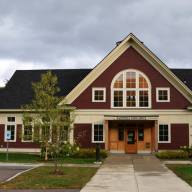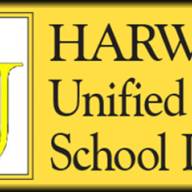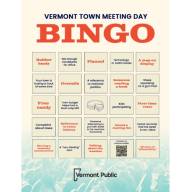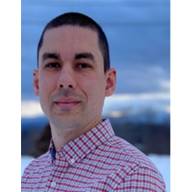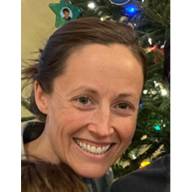Warren Select Board member (and former chair and vice chair) Bob Ackland, and Fayston Select Board chair (and longtime board member) Jared Cadwell are retiring from their town boards at Town Meeting this year.
Both have also been on the Mad River Valley Planning District steering committee for decades.
The Valley Reporter asked them to sit for an interview about their service and they agreed.
VR: Tell me about your public service, how did it start?
Ackland: I started with the Vermont Council on Rural Development in 2002. I served there for 12 years, the last two as chair. During that time, I was working for Sugarbush and was Sugarbush’s representative to the planning district’s steering committee. I got on the select board in 2020, I think and continued to serve on the steering committee.
Cadwell: I moved to The Valley in 1979 and in the mid-80s I joined the first iteration of a recreation district board, serving with Ted Joslin and Pam Thompson. We were looking for rec fields then and I remember an ill-fated effort to purchase the big meadow across from Hartshorn’s vegetable stand. It got shot down. But, 20 years later, we’ve got the Mad River Rec Fields. I got on the steering committee 22 years ago, after I had been elected to the select board in 1993. I succeeded because David Boileau on the steering committee.
VR: What are some of the things you're most proud of in terms of what you've done for your towns, with your towns and also with the steering committee.
Ackland: Well, from the town perspective, I think the most gratifying thing to me was to really put the budget in a much better frame for presenting to the town. And I have consistently since my second year, as a board member, I have presented the budget annually to the town and I'm really proud that it's passed unanimously every time with probably really no dissent or real challenge. And I think the second thing was, from a town perspective was when I got on the board, we had a lot of issues relative to roads. So, I dug into that. And my first attempt was to the board was said, what are we going to do about the Sugarbush Access Road? It's really bad and has to be redone and we don't have the money. I said, why don't we ask the town for the money? Let's put it before the voters. Everybody looked at me said ‘what’? I said, I’d really would like to do that. And they said, ‘Go ahead. You can try.’ There was a lot of skepticism. And we did it as a separate warrant. And it passed again unanimously. What I did was present the entire package of our road status and what had not been done and what needed to be done and quite frankly, was about a $4.5 million package at that time. And it was sort of an example for the other towns to follow. It was very gratifying. It made me realize that you can’t be sitting on the board and be thinking you know everything, and you know what everybody's thinking because you don't. Be open and honest with people and let them let the public decide. That was very gratifying. For me, that was a real lesson – you put your case in front of the voters and let them decide.
Cadwell: I think we learned a lot from that, Bob. I mean, you and I had conversations about your process. And, of course, our needs, relatively speaking, are more modest. From my perspective, the work of local government in Fayston is less complicated in comparison to Waitsfield and, and Warren, insofar as there's not a big commercial district, there aren't Valley floor challenges. We don't have municipal water and sewer. What I've enjoyed the most is the relationship building over the 30 years, and plus the years I was on the rec district, or just getting to know folks in in town and in The Valley and try to tap into their interest in the larger community, whether it was in relationship to conservation efforts or recreation, development or doing the good conservative Yankee financing, which I learned a lot about from Bob Vasseur. By that I mean not borrowing money. I'm proud that during the time I have been on the board, I think we've only taken out a loan once and it was as if I had Bob Vasseur on my right shoulder saying ‘Are you sure we should be doing this?’ I think it was to the tune of like $40,000 for bridging a purchase of a sidearm mower, but you know, we've been able to afford pretty consistent and good care of our roads and transportation infrastructure in town and I think what I have come away from my years of service with is that we have a limitless source of talent in this valley. And it's harnessed in, you know, really constructive ways. I think that circles back to the steering committee and to the planning district that were much stronger and effective in addressing community challenges. If, in fact, we do address challenges as a community, in the case of the planning district, three towns. I know Bob, and I, because of our years of service on the steering committee have really seen the growth and strengthening of the planning district effect our individual communities and The Valley as a whole.
Ackland: from my perspective, both the steering committee and the select board were not overly time consuming, but it took a fair amount of time and you know, I really, I really enjoyed the steering committee, it was a great group of people most of the time. And it really, from my own personal growth, it expanded considerably how I looked at them. So, I shouldn't say it's kind of expanded. But really, it gave me much more appreciation for the value of having a variety of input to make decisions. My outlook has been a much broader one than each single town. I really look at the Mad River Valley as an entity and a community. The town governments -- I mean, candidly, I think that there should be one town, but that'll never happen.
Cadwell: As we look forward, the need to work across local government boundaries. political boundaries is greater than ever. And we're so fortunate that we've, we had the foresight 40 years ago, to develop a municipal district, that gives us the forum to meet some of those challenges, you know, and we know what they are right now. It's climate change, it’s housing. And, you know, both of those, we're going to be, you know, looking more and more to the planning district for art information, which, you know, we're gathering and tapping in, again, back to, you know, the incredible human resources we have here. With so many people that are involved in right now for-profit initiatives, like Friends of the Mad River, path, the Community Fund, Rotary, etc.
VR: Final thoughts? And what is next?
Ackland: Leaving the select board has been a challenge. It was something that I struggled with because the real struggle was leaving the planning district if I could stay in the planning district, I happily do that. I just have to accept that I'm no longer a select board member. So, I no longer can be a member of the steering committee. The steering committee came out of that January 2022 funders meeting with a clear understanding that wastewater for Waitsfield was something that should be a priority for us and we directed executive director Joshua Schwartz to spend a year working on that. That is Warren and Fayston directly participating in helping Waitsfield get municipal wastewater.
Cadwell: I'm looking forward to looking at how we're doing things here in The Valley, from a different perspective. From the perspective, maybe of, you know, from a nonprofits’ perspective, maybe. And, you know, stepping back is, I think it's a good thing. I think it's healthy. I'm really hopeful that, you know, I, that I can get the next generation kicked into this, you know, into the select board work or DRB work or planning commission, work. I mean, I started, I think, I was in my early 30s. We do have a number of folks in that age group engaged here in The Valley and I just, feel that the more the merrier. They are the future.



